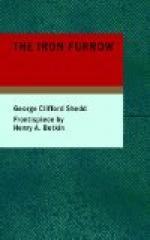Only an insignificant stream of water ran, one day, in the stony creek bed that meandered out upon the mesa, and it appeared under the hot July sun and among the hot stones for all the world like a rivulet of liquid glass. That was all the mesa had to show, only its endless gray sagebrush and the creek bed almost dry—unless one should reckon the three parched cottonwood trees beside the stream, a little way down from the canon, and the flat-roofed adobe house near by, and the empty corral behind built of aspen poles. In that immensity of mountain and mesa the house looked like a brick of sun-baked mud, the corral like a child’s device of straws, the three cottonwoods like three twigs stuck in the earth. Or, at any rate, that is how they appeared to a horseman regarding them from the main mesa trail a mile away.
The rider, a slender tanned young fellow of about twenty-eight, sat in the saddle with the relaxed ease of habit which allowed his body to accommodate itself to the steady jogging trot of his horse. A roll comprising clothes wrapped in a black rubber coat was tied behind the cantle. His Stetson hat was tilted up at the rear and down in front almost on his nose—a thin, bony nose, slightly curved and with the suggestion of a hook in the tip, just the sort of nose to accord with his lean, sunburnt cheeks and clean-cut chin and straight-lipped mouth. Under the hat brim drawn forward to his line of vision his eyes, notwithstanding his air of lounging indolence, gazed forth keen and observant. He had the appearance of a man who might be seeking a few stray cattle, or riding to town for mail, and in no particular hurry about it, either, this hot afternoon; but, for all that, Lee Bryant was proceeding on important business—important for him, anyhow. When everything one possesses is about to be risked on a venture, the matter is naturally vital; and at this moment he was moving straight to the initiative of his enterprise.
Where the road crossed the creek bed to continue northward, a trail branched off and followed up the stream to the little ranch house by the three cottonwood trees. Here the creek had not yet begun to cut an arroyo and had washed merely a course five or six feet deep and some fifty feet wide through the mesa, so that from a distance the shallow gash was invisible and the ground appeared unbroken. It was because of the flat character of the mesa, too, that Bryant on reaching the bank of the stream was able to see on the opposite side two persons a quarter of a mile off riding toward him; women, he perceived. Far north of them on the road, a black spot in a haze of dust, seemingly motionless but as one could guess advancing rapidly, was an automobile.
Bryant rode his horse down into the creek bed and turned him aside to a small pool on the upper side of the crossing, under the cut-bank, where the horse thrust his muzzle into the water and drank greedily. The rider swung himself out of the saddle, knelt a pace beyond, where the rivulet trickled into the pool, and also drank.




